MPST
3-mercaptopyruvate sulfurtransferase is an enzyme that in humans is encoded by the MPST gene.[3][4]
This gene encodes a protein which can function as a monomer or as a disulfide-linked homodimer and which catalyzes the transfer of a sulfur ion from 3-mercaptopyruvate to cyanide or other thiol compounds. It may be involved in cyanide degradation and in thiosulfate biosynthesis. The encoded cytoplasmic protein is a member of the rhodanese family but is not rhodanese itself, which is a mitochondrial protein. Alternatively spliced transcript variants encoding the same protein have been identified.[4]
References
Further reading
- Billaut-Laden I, Rat E, Allorge D, et al. (2006). "Evidence for a functional genetic polymorphism of the human mercaptopyruvate sulfurtransferase (MPST), a cyanide detoxification enzyme.". Toxicol. Lett. 165 (2): 101–11. doi:10.1016/j.toxlet.2006.02.002. PMID 16545926.
- Gerhard DS, Wagner L, Feingold EA, et al. (2004). "The status, quality, and expansion of the NIH full-length cDNA project: the Mammalian Gene Collection (MGC).". Genome Res. 14 (10B): 2121–7. doi:10.1101/gr.2596504. PMC 528928
 . PMID 15489334.
. PMID 15489334.
- Collins JE, Wright CL, Edwards CA, et al. (2005). "A genome annotation-driven approach to cloning the human ORFeome.". Genome Biol. 5 (10): R84. doi:10.1186/gb-2004-5-10-r84. PMC 545604
 . PMID 15461802.
. PMID 15461802.
- Ota T, Suzuki Y, Nishikawa T, et al. (2004). "Complete sequencing and characterization of 21,243 full-length human cDNAs.". Nat. Genet. 36 (1): 40–5. doi:10.1038/ng1285. PMID 14702039.
- Strausberg RL, Feingold EA, Grouse LH, et al. (2003). "Generation and initial analysis of more than 15,000 full-length human and mouse cDNA sequences.". Proc. Natl. Acad. Sci. U.S.A. 99 (26): 16899–903. doi:10.1073/pnas.242603899. PMC 139241
 . PMID 12477932.
. PMID 12477932.
- Dunham I, Shimizu N, Roe BA, et al. (1999). "The DNA sequence of human chromosome 22.". Nature. 402 (6761): 489–95. doi:10.1038/990031. PMID 10591208.
- Aita N, Ishii K, Akamatsu Y, et al. (1997). "Cloning and expression of human liver rhodanese cDNA.". Biochem. Biophys. Res. Commun. 231 (1): 56–60. doi:10.1006/bbrc.1996.6046. PMID 9070219.

 . PMID 15489334.
. PMID 15489334. . PMID 15461802.
. PMID 15461802. . PMID 12477932.
. PMID 12477932.